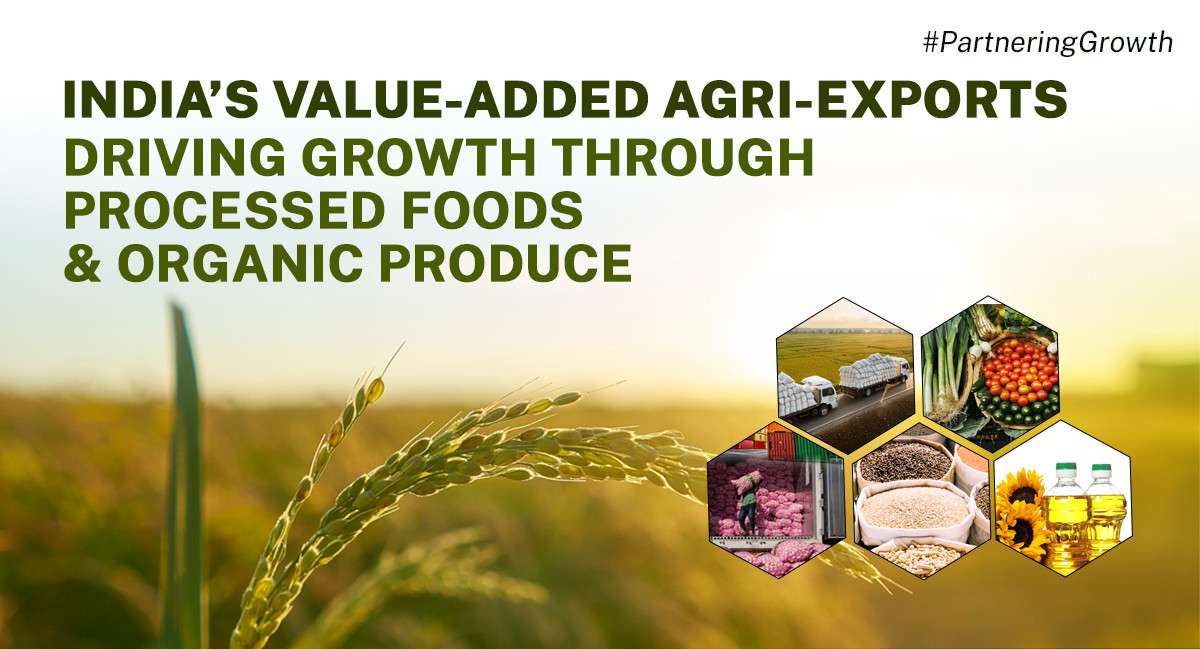


Agriculture has long been the backbone of India’s economy, and in recent years, the sector has witnessed a quiet transformation. With India’s total agricultural and processed food exports reaching approximately USD 49.4 billion in FY 2024-25, processed food exports constituted around 20.4% of the total, marking a significant jump from 13.7% a decade ago.
Traditionally, India’s agri-exports were centred around bulk commodities such as grains, pulses, tea, and spices. While these continue to be important, a new growth story is unfolding in the value-added space, with processed food now accounting for roughly one-fifth of India’s agricultural exports.
The shift towards value addition
Globally, consumers are increasingly looking for healthier, convenient, and sustainable food options. This has created space for Indian exporters to move beyond raw produce and develop a strong presence in ready-to-cook, ready-to-eat, frozen, and minimally processed categories. From frozen fruits and vegetables to spice mixes and dairy products, India’s value-added offerings are gaining traction across international markets.
This shift has multiple benefits. For farmers, it creates a stable demand and better price realisation. For exporters, it enhances competitiveness, as processed goods fetch higher margins than raw commodities. For the economy, it helps build a reputation for quality and reliability in global agri-trade.
The organic opportunity
Alongside processed foods, organic farming is emerging as a strong pillar of India’s export basket.
With organic food exports rising to about USD 665.96 million (around ₹5,700 crore) in FY 2024-25, compared to USD 494.8 million in the previous fiscal year, India stands among the top producers of organic products such as cereals, oilseeds, tea, coffee, spices, and fruits. With rising awareness about chemical-free farming and sustainable agriculture, markets in the US, EU, and the Middle East are witnessing sharp growth in demand for organic products.
Certification, traceability, and compliance with stringent international standards are critical in this space. India has built an extensive certification framework with a significant number of organic-certified processing units under the National Programme for Organic Production (NPOP), ensuring robust traceability and quality standards. As of July 18, 2025, the NPOP certification system includes 4712 active organic grower groups covering approximately 19.29 lakh farmers certified under the programme.
Challenges to overcome
While the opportunities are significant, challenges remain. Post-harvest losses, fragmented supply chains, and infrastructure gaps in cold storage and logistics continue to affect efficiency. Quality control and meeting the regulatory standards of importing countries require sustained attention. For small and marginal farmers, access to processing units, financing, and global markets is often limited.
The road ahead
To scale value-added exports, India will need deeper investment in food processing infrastructure, better farmer–processor linkages, and stronger quality assurance systems. Digital traceability platforms and farm-level capacity building can also play an important role in addressing global buyer requirements.
The government’s push through schemes such as the Production Linked Incentive (PLI) for food processing, and initiatives to promote “One District, One Product” are steps in the right direction. But equally important is the collaboration between farmers, processors, logistics providers, and policymakers to ensure India can consistently deliver high-quality products to the world.
India’s agri-export story is entering a new phase. Moving from being a supplier of bulk commodities to a trusted partner in processed foods and organic produce, the country has the potential to capture a larger share of global value chains. For farmers, processors, and consumers alike, this marks the beginning of a more sustainable and rewarding growth journey.